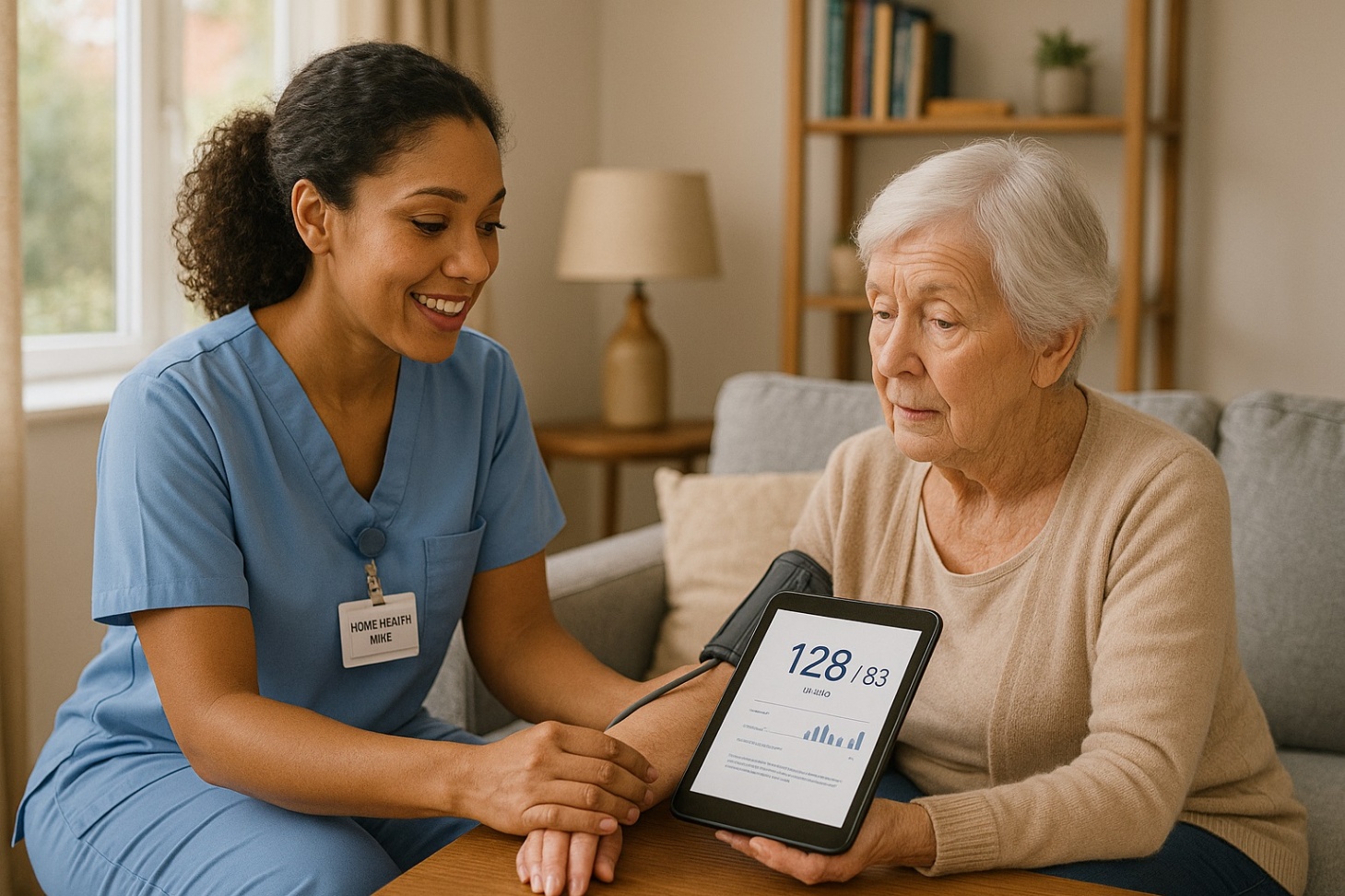Home health aides (HHAs) support older adults and people with disabilities at home with essential daily-care tasks and basic health-related assistance.
This guide explains what home health aides do, what they cannot do, how pay works, and whether Medicare covers home health aides.
It draws on official U.S. government sources and current labor data so you can make safe, informed choices. Medicare+2Bureau of Labor Statistics+2
What Home Health Aides Do
HHAs help clients with activities of daily living (ADLs) such as bathing, dressing, grooming, toileting, and safe transfers.
Depending on the care plan, they may check vital signs, assist with simple exercises, remind about medications, and prepare light meals.
They also do limited housekeeping related to patient care and report changes in condition to supervising nurses.
Under federal rules for Medicare/Medicaid-certified agencies, aides must complete training and competency evaluation and work under clinical supervision.
Training and oversight (what to expect)
For agencies that are Medicare-certified, federal regulations require at least 75 hours of combined classroom and supervised practical training.
Plus at least 12 hours of annual in-service training thereafter.
Agencies must document competency and keep RN supervision in place. This structure protects clients and clarifies the aide’s scope of work.

What Home Health Aides Are Not Allowed To Do
In general, HHAs may not perform skilled medical procedures (for example: administer injections, start or manage IVs, change sterile dressings)
They also should not make clinical assessments or modify the care plan—those tasks belong to licensed nurses or therapists.
Scope of practice and allowances vary by state and employer, but the federal Medicare Conditions of Participation set a clear floor.
HHAs provide personal care and limited health-related tasks under supervision; skilled interventions require licensed professionals.
Practical takeaway: If you expect wound care, injections, new meds, or frequent clinical monitoring, you likely need skilled nursing or therapy in addition to an aide.
How Much Do Home Health Aides Make
The U.S. Bureau of Labor Statistics reports the May 2024 median annual wage for “Home Health and Personal Care Aides” at $34,900.
The lowest 10% earned around $25,600, and the highest 10% earned more than $44,190.
State and metro wages vary widely; for instance, recent BLS tables show higher averages in West Coast and Northeast markets than in parts of the South.
Demand remains high as the population ages, but agencies continue to face staffing shortages, which can affect availability and scheduling.
Medicare Coverage: Does Medicare Cover Home Health Aides?
It does only when they are part of a covered home health episode that includes intermittent skilled nursing or therapy.
To qualify, you must be under a doctor’s care with a plan of care and be considered homebound under Medicare’s definition.
Medicare defines “intermittent” skilled nursing as fewer than 7 days per week or less than 8 hours per day for up to 21 days.
Crucially, Medicare does not cover standalone, long-term custodial care when skilled services are not also needed.
How to Find Home Health Aides Near Me (step-by-step)
You can locate Medicare-certified home health agencies and compare quality scores using the federal Care Compare directory.
This tool lets you search by ZIP code, view patient experience ratings, check service offerings, and confirm Medicare certification.
It is the most direct way to identify agencies that can provide aid services as part of covered home health care.
- Open Medicare Care Compare and choose “Home health services.” Enter your city or ZIP.
- Review each agency’s star ratings, patient survey results, and services. Confirm the staff HHAs.
- Call the top candidates. Ask about start-of-care timelines, aide availability, languages spoken, and weekend or evening coverage.
- If you have a qualifying episode, verify that they will coordinate with your physician on orders and eligibility.
- If you need private-pay support (no skilled services), ask whether the agency offers non-Medicare private-duty aide services, hourly rates, and minimum shifts; or consider reputable private-hire platforms with background checks.
You can also consult local Area Agencies on Aging, hospital discharge planners, or a geriatric care manager.
Search for vetted referrals, cost guidance, and help matching needs to the appropriate type of caregiver (HHA vs. personal care aide vs. CNA).
Costs and Payment Options (when Medicare doesn’t apply)
For private-pay aide services (custodial, non-skilled care), national media and industry surveys commonly report hourly rates in the low-to-mid-30s.
Families may also explore Medicaid Home- and Community-Based Services (HCBS) waivers.
Veterans benefits (Aid and Attendance or Homemaker/Home Health Aide programs), or long-term care insurance policies if available.
Aides hired privately require you to manage payroll, taxes, and coverage (e.g., workers’ compensation).

Frequently asked questions
What’s the difference between an HHA and a personal care aide?
- Titles overlap in everyday use, but home health aides typically have formal training and work under clinical supervision (especially in Medicare-certified agencies). Personal care aides may focus more on companionship and household support, with variable training standards. Some states use “certified HHA” or require CNA credentials for certain tasks. Check your state’s rules and the agency’s staffing model.
How quickly can services start?
- Agencies aim to begin care promptly after a physician’s order and eligibility verification for Medicare episodes, but timelines depend on staffing, geography, and the complexity of your needs. Ongoing workforce shortages can stretch start dates; ask about availability during your first call.
Can aides help with medications?
- Aides can remind clients to take pre-set medications and report side effects, but should not decide doses or administer injections unless state rules and employer policy allow and a licensed professional delegates appropriately. For anything beyond reminders and observation, you need nursing support.
Bottom Line
Start by clarifying the level of care you need: personal care only, or personal care plus skilled nursing or therapy.
If you don’t qualify, plan for private-pay aide support or explore Medicaid, VA, or long-term care insurance options.
Use Care Compare and local aging-services networks to identify and vet providers, compare quality, and confirm scope and costs before you commit.











